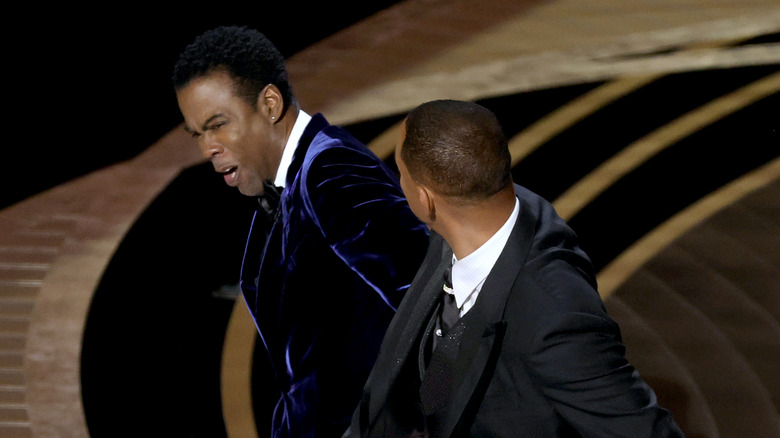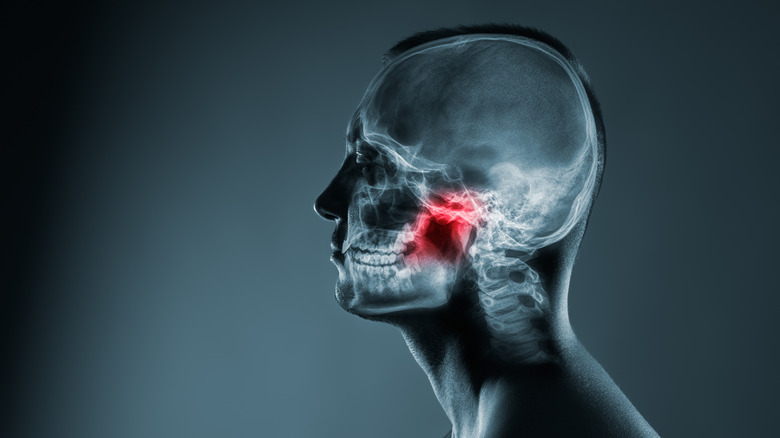Science Has Proven That Slapping Someone To Death Is Possible
The 94th Academy Awards, aired on March 27, 2022, featured what may have been one of the most memorable moments in the history of the event. Specifically, as Futurist reports, actor Will Smith took umbrage with a joke delivered by Chris Rock about Smith's wife, and walked onto the stage and slapped him. Rock, though momentarily stunned, appeared to have recovered rather quickly from the slap, even smiling and joking about it once he got his bearings.
As acts of assault go, slapping someone is usually a relatively minor one. For millennia, as theologian Alison Cook noted on her blog, slapping someone on the cheek (the right one specifically) was a way of putting someone of a lower station in their place, an act of violence reserved for women, children, and slaves. Indeed, you may be familiar with the concept of an abuser threatening a victim with "the back of [their] hand."
But does slapping someone in the face transcend the line between "abusive" and "potentially fatal"? In fact, science has concluded that it is totally possible to kill someone with a slap.
Reaction to the Smith-Rock slap
The seemingly-impossible idea that Will Smith could have killed Chris Rock by slapping him was not lost on the general public, many of which posted their thoughts to social media, as Futurist reports. Writer/producer Judd Apatow, for one, was particularly outraged, saying that Rock could have killed Smith and calling it "out of control rage and violence." Apatow later deleted the tweet after what Futurist described as a "wave of mockery."
Another Twitter user took the comedic view, suggesting that the only way Smith could have killed Rock with that slap was through a compounding series of errors. Specifically, the user said that it would have required Smith's hand to somehow contain a bee, for Rock to be allergic to bee stings, and for no one in the theater that night to have had an Epi-Pen. "Not so funny now is it," the user asked rhetorically, tongue seemingly planted firmly in cheek.
It's not known how much force Will was able to conjure up in order to slap Rock. Further, it bears noting that Rock is an adult man in good shape physically and not, by comparison, a child or in ill health. Nevertheless, had the conditions been exactly right, the slap could, theoretically, have killed him.
a blow to the head is never good
The human head has evolved to, by and large, endure the knocks and jostling about that we'll encounter from time to time; there's a reason the bones of the skull are some of the thickest in the human body. Nevertheless, in all things there are limits, and a blow to the head — any blow to the head — delivers a shock wave to the skull and to the contents within it.
In most cases, if a concussion results, it's generally mild, according to The Concussion Place, and treatment involves little more than keeping an eye on the patient to make sure they don't develop more severe symptoms, such as vomiting. And of course, repeated concussions, such as via a lengthy career playing football, can wreak havoc on the human brain.
When someone is slapped, it's possible they could experience a concussion (after all, the face is a part of the head). And those concussions can range from mild to severe to fatal, and there are a few other things that can go wrong that can result in death as well.
The science of fatal slaps
In order to figure out what is required to deliver a slap that kills someone, the first step is understanding how much force a human can deliver. As Live Science explains, trained boxers — who, it bears noting, are in peak physical shape and are trained in delivering as much force as possible via their punches — can produce a force of about 5,000 newtons. Of course, how much power a non-boxing adult can muster up is going to be far less.
Regardless, it's not necessarily the blow to the head, directly, that can result in death. When struck, such as with a punch or slap, the head will often abruptly turn. In cases of a really, really solid punch — the type that results in your head accelerating from 0 to 43,000 rpm instantly — it can be a much bigger deal than an ordinary playground slap. Around 25% of those kinds of severe, neck-whipping hits can render the victim unconscious.
It was that sudden turning of the head that led to the death of a Canadian girl in 2010, as the Daily Mail reports. 13-year-old Noutene Sidime's father slapped her so hard, and her head turned so violently, that she ruptured an artery in her neck. In another case of death by slapping, reported by the New York Daily News, a teenager slapped an Italian tourist so hard that he fell to the ground and suffered a severe concussion, and died two days later.
Compounding consequences
You may have noticed, from reading the two anecdotes above, that a fatal slap isn't always necessarily the result of the slap itself — which is to say, the force of the assailant's hand hitting the victim's head (a fatal vaso-vagal shock, in medical parlance). Usually, it's something secondary that causes it, such as, in the cases mentioned above, an artery being ruptured from the force of the head-turning, or a secondary head injury sustained after falling.
Other anecdotal stories of fatal slaps tend to bear this out. For example, in a Georgia case from 2017, reported by WXIA, 38-year-old Tomas Rodriguez was slapped by another man at a birthday party, and he died a short time later. Police determined that the cause of death was a ruptured artery from his head and neck being turned so violently. Similarly, in a case out of the U.K. reported by BBC News, a father and his 19-year-old son were playing a slapping game after visiting a few pubs when one slapped the other so hard that he fell to the ground. Police determined that it was the blow from the pavement that killed him.
women, children, the elderly
Another trend you may have picked up on from reading this article is that, with some exceptions, the victims of fatal slaps have largely been women, elderly people, or children. There are several reasons for that, not the least of which is that such assaults are likely to occur within the context of domestic violence, according to the National Coalition Against Domestic Violence. And while women and, sometimes children (usually teenagers) can be abusive in their homes, women are more likely to endure prolonged, repeated domestic violence than men, according to Women's Aid.
Also, men are generally stronger physically than women (there are, of course, exceptions) and are certainly stronger than children or the elderly. That means that men are more likely to deliver fatal slaps, particularly if their victims are women, children, or an elderly person, and that men are more likely to survive even a vicious slap that might otherwise kill a woman or child.





